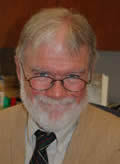
If you subscribe to Saint Anselm’s notion of theology as “faith seeking understanding,” it is difficult to imagine how, exactly, a theologian “retires,” but a professor certainly can, and Lawrence S. Cunningham, John A. O’Brien Professor of Theology at Notre Dame, will do so next year. His academic career spans a half-century, and he has spent a quarter-century of it on Notre Dame’s theology faculty as one of its most popular teachers.
But he also has been prolifically energetic outside Notre Dame’s classrooms and lecture halls, chairing the Department of Theology from 1992 to 1997, writing for a wide variety of scholarly and popular journals, contributing numerous articles to encyclopedias and dictionaries of religion and publishing some 25 books. Earlier this month he received the University of Portand’s highest honor, the Christus Magister Medal, and also has honorary degrees from Bellarmine University, Neumann College and Saint Anselm’s College.
A scholar of systematic theology and culture, Christian spirituality and the history of Christian spirituality, Cunningham, like all gifted teachers, is able to make complex and sometimes arcane subjects comprehensible. That skill — applied to Church history, liturgy, doctrine, governance and spiritual life — has endeared him to his students and earned him several teaching awards, but also has been widely noticed by journalists covering religious topics, who frequently consult, quote and interview him.
Whether or not he will continue to answer their phone calls at home, Cunningham is pleased that retirement will allow him more time, as he says, to “putter in the garden, watch birds desultorily, write, listen to the radio, haunt art museums, visit our daughters, and follow Notre Dame sports, particularly women’s soccer.”
Although Cunningham is unlikely to write a memoir, it is agreeable to learn that his retirement plans include writing. He would likely share W.H. Auden’s opinion that “biographies of writers, whether written by themselves or others, are always superfluous and usually in bad taste. A writer is a maker, not a man of action.” Auden made those remarks to introduce his wonderful A Certain World, a sort of scrapbook he had compiled of quotations and occasional commentary that provided what he called “a map of my planet.” It was as close as he would come to writing an autobiography.
Cunningham’s similar book, Things Seen and Unseen: A Catholic Theologian’s Notebook, recently published by Sorin Books is drawn and edited from the notebooks in which he has for years jotted down random thoughts, striking quotations, reactions to local and international news, meditations, puns, jokes and prayers. “Reading journals and diaries of other people has always been a pleasure to me,” he writes, “so it struck me that others might like a peek into the vagrant workings of one theologian’s mind.”
The entries rarely exceed the length of a page and often bring Cunningham’s teaching experience into conversation with other writers. Thinking about what Walker Percy wrote about the trivialization of religious language, for instance, he observes, “I see it every day in the classroom. Say the word ‘sin’ and you can see heavy metal shutters coming down at the entrance of young ears. Our religious language has become, to borrow Percy’s phrase, like ‘worn out poker chips,’ rubbed down from too much usage.”
Cunningham will never be accused of contributing to such erosion, and even a desultory reading of Things Seen and Unseen reveals in “the vagrant workings of one theologian’s mind” an ongoing and heartening attempt to resist it.
“These various scribbles have been an enjoyable way, if not to waste time, certainly to fill up some period when, otherwise, I would have been staring out my office window,” Cunningham writes in his notebook’s last entry. Literate people whose faith pursues understanding should rejoice that he will soon have more such time to fill.
Michael Garvey is Notre Dame’s assistant director of public information and communication. Email him at garvey.2@nd.edu.